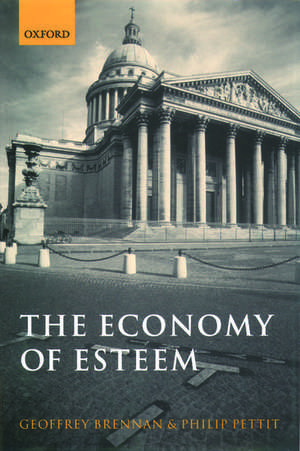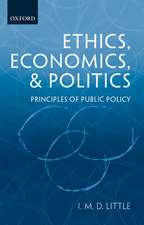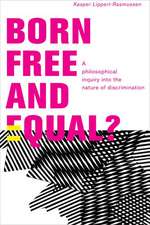The Economy of Esteem: An Essay on Civil and Political Society
Autor Geoffrey Brennan, Philip Pettiten Limba Engleză Hardback – 18 mar 2004
| Toate formatele și edițiile | Preț | Express |
|---|---|---|
| Paperback (1) | 356.41 lei 31-37 zile | |
| OUP OXFORD – 15 dec 2005 | 356.41 lei 31-37 zile | |
| Hardback (1) | 325.10 lei 31-37 zile | |
| OUP OXFORD – 18 mar 2004 | 325.10 lei 31-37 zile |
Preț: 325.10 lei
Preț vechi: 388.13 lei
-16% Nou
Puncte Express: 488
Preț estimativ în valută:
62.22€ • 64.46$ • 51.92£
62.22€ • 64.46$ • 51.92£
Carte tipărită la comandă
Livrare economică 11-17 martie
Preluare comenzi: 021 569.72.76
Specificații
ISBN-13: 9780199246489
ISBN-10: 0199246483
Pagini: 352
Ilustrații: numerous figures
Dimensiuni: 162 x 242 x 25 mm
Greutate: 0.67 kg
Editura: OUP OXFORD
Colecția OUP Oxford
Locul publicării:Oxford, United Kingdom
ISBN-10: 0199246483
Pagini: 352
Ilustrații: numerous figures
Dimensiuni: 162 x 242 x 25 mm
Greutate: 0.67 kg
Editura: OUP OXFORD
Colecția OUP Oxford
Locul publicării:Oxford, United Kingdom
Recenzii
Brennan and Pettit's book raises a great number of questions of both theoretical and empirical importance. Innovative and illuminating, this book is an interesting contribution to philosophically inspired social sciences.
Although aimed primarily at academics specialising in economics or behavioural studies, this is an interesting volume that provides a framework for analysing individual and group behaviour that as far as this reviewer is concerned has relevance far beyond the discipline of economics.
'...The Economy of Esteem illuminates a serious inadequacy in the way that the economic approach has been used conventionally; its own creative use of that approach makes its claims all the more credible.'
'...Brennan and his co-author Pettit are laying out some of the most important arguments in social science today...Read this book carefully. It could, should, and probably will give rise to many subsequent studies.'
Although aimed primarily at academics specialising in economics or behavioural studies, this is an interesting volume that provides a framework for analysing individual and group behaviour that as far as this reviewer is concerned has relevance far beyond the discipline of economics.
'...The Economy of Esteem illuminates a serious inadequacy in the way that the economic approach has been used conventionally; its own creative use of that approach makes its claims all the more credible.'
'...Brennan and his co-author Pettit are laying out some of the most important arguments in social science today...Read this book carefully. It could, should, and probably will give rise to many subsequent studies.'
Notă biografică
Philip Pettit was born (1945) and trained in Ireland, first at the National University (Maynooth College), where he took a BA. and M.A, and later at Queen's University, Belfast, where he took his Ph.D. He taught in University College, Dublin (1968-72, 1975-77) before holding a Research Fellowship at Trinity Hall, Cambridge (1972-75) and then, in 1977, taking the Chair of Philosophy at Bradford University. He moved to the Australian National University in 1983, where he was Professor of Social and Political Theory until 2002, when he moved to Princeton University. He taught at Columbia University as a regular Visiting Professor of Philosophy from 1997 to 2001. He teaches political theory and philosophy at Princeton, where he is William Nelson Cromwell Professor of Politics.Geoffrey Brennan trained originally as a public economist, but increasingly works in rational actor political theory. He was for ten years in the department of Public Finance at ANU, before he went to a Professorship in the Public Choice Center at Virginia Tech where he worked with Nobel Laureate James Buchanan. In 1983, he returned to the ANU to be head of the Economics Department and in 1991 became Director of the Research School of Social Sciences, a position which he held until 1997. He is currently Editor of the journal Economics and Philosophy, and President of the Public Choice Society. He currently holds a Chair in the RSSS in the Social and Political Theory Program.


















